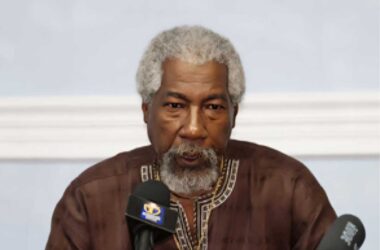
Prime Minister Philip J. Pierre is leading a seven-member delegation on an official five-day visit to Taiwan, where’s he’ll meet President Tsai Ing-wen and government officials and visit strategic agencies to explore areas for partnership, particularly for Saint Lucia’s youth.
PM Pierre’s team includes government ministers, public and private sector representatives and youth advocates.
The visit (from November 28 to December 2) started two days after Taiwan’s ruling Democratic People’s Party (DPP) lost recent mid-term local government elections, which led to President Tsai resigning as party leader.
Pierre is the third leader from Taiwan’s three allies in the Organization of Eastern Caribbean States (OECS) to visit the Chinese island in the past four months, after neighbouring St. Vincent & The Grenadines Prime Minister Dr Ralph Gonsalves visited in early August, followed by St. Kitts & Nevis Prime Minister Dr Terrence Drew, on November 7.
Taiwan counts heavily on the support of its remaining allies, most of which are located in the Caribbean and Central America.
Not being an independent nation and therefore not recognized as a country by the United Nations (UN), the island’s elected administration nonetheless hosts heads of government of states that recognize it officially.
The official visits normally include military parades, formal state functions and visits to prominent places such as the parliament, national museums, universities and prominent tourism sites.
Pierre will discuss deeper and closer cooperation ties between the two islands, first established in 1983, interrupted in 1997 and restored ten years later, thanks to successive regime changes between governments led by the now-ruling Saint Lucia Labour Party (SLP) and the opposition United Workers Party (UWP).
Taiwan ties its’ ties with allies to bilateral agreements, different administrations in Taipei and Castries chiseling respective ties according to prevailing circumstances, with the one dominant feature being allies’ support for Taipei’s annual efforts to enter international agencies it would like to join and Taiwan’s generosity in return.
OECS member-states Saint Lucia, Saint Kitts and Sant Vincent & The Grenadines – ‘The Three Saints’ – annually support Taipei’s bids to join the international police agency INTERPOL, the International Civil Aviation Organization (ICAO) and the World Health Assembly (WHA).
But thanks to its international diplomatic isolation (with 188 UN member-states recognizing China versus 12 for Taiwan) the tiny island off mainland China’s Fujian province is unable to enter any UN agency without Beijing’s support.
The Saint Lucian delegation’s visit – paid for by Taipei – came just as the DPP Leader quit after it did badly in local government elections last week – also seen as a mid-term vote on her party’s domestic and international policies.
According to a November 26 Reuters story by Sarah Wu and Yimou Lee titled Taiwan votes in local polls amid China tensions:
“President Tsai Ing-wen resigned as head of the ruling DPP on Saturday after her strategy to frame local elections as showing defiance to China’s rising bellicosity failed to pay off and win public support.”
It added: “The elections for mayors, county chiefs and local councilors are ostensibly about domestic issues such as the COVID-19 pandemic and crime, and those elected will not have a direct say on China policy.
“But Tsai had recast the election as being more than a local vote, saying the world is watching how Taiwan defends its democracy amid military tensions with China, which claims the island as its territory.”
At the time of the resignation: “The main opposition party the Kuomintang (KMT), was leading or claimed victory in 13 of the 21 city, mayor and county chief seats up for grabs, including the capital Taipei, compared to the DPP’s five, broadly in line with expectations and similar to the results of the last local elections in 2018.”
But Madam Tsai has been defiant.
She told reporters at her party’s headquarters: “The results failed our expectations. We humbly accept the results and accept the Taiwanese people’s decision. It’s not like the DPP has never failed before. We don’t have time to feel sorry. We fell, but we will stand up again.”
It was the second time Madam Tsai quit as party head — which she also did after the DPP’s similarly poor results in 2018 – but she will continue serving as president until 2024.
According to Reuters, “The KMT accused Madam Tsai and the DPP of being overly confrontational with China, and of trying to besmirch the party for being ‘red’ — a reference to the colours of the Chinese Communist Party.
The KMT also focused its campaign on criticising the government’s response to the COVID-19 pandemic, especially after a surge in cases this year.
KMT Chairman Eric Chu celebrated their victory, saying “We will insist on defending the Republic of China and protecting democracy and freedom. We will also work hard to keep regional peace.”
Naturally, having badly lost the mid-terms, the DPP’s focus will now turn to the 2024 presidential and parliament election, which President Tsai and the DPP first won in 2016, then again by a landslide in 2020, that time “on a pledge to stand-up to China and defend Taiwan’s freedoms.”
The DPP Leader is halfway through her second term in office and cannot stand again as president because of term limits.
Taiwan’s midterm elections took place a month after the 20th Congress of the Communist Party of China (CPC), where President Xi Jinping secured a third term as General Secretary and President — a point Madam Tsai repeatedly made on the recent long campaign trail, sparking sparkling speculation in the foreign press that she (just) might make a case for constitutional change: to also do away with term limits.
Meanwhile, Reuters reports, “China’s Taiwan Affairs Office said the mid-term result showed that mainstream Taiwanese public opinion was for peace, stability and ‘a good life’ and Beijing would keep working with Taiwan’s people to promote peaceful relations and to oppose Taiwan independence and foreign interference.”











